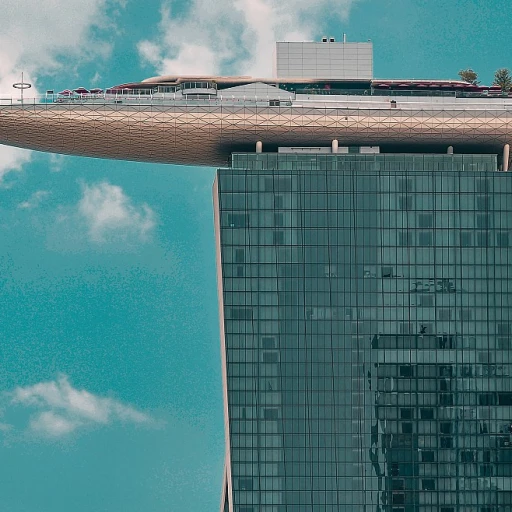The Sustainability Debate in Space Tourism
Unearthing the Eco-Dilemma of Galactic Vacations
As we stand on the precipice of a new era of travel, the sustainability debate in space tourism is catching the attention of eco-conscious adventurers and environmental experts alike. As the space tourism industry takes its nascent steps, the debate intensifies around one key issue: can the wonder of exploring the cosmos coexist with the urgent need for environmental stewardship? Space tourism sustainability has become a buzzword, as 82% of consumers report they want to travel more sustainably in the future, according to a recent Booking.com report.
Grasping the Greenhouse Gas Emissions in Orbit
With the increasing demand for exclusive trips to outer space, the focus on carbon footprint becomes more pronounced. As spaceflights venture beyond Earth's atmosphere, they leave behind a trail of greenhouse gas emissions. While statistics on emissions from space tourism are still emerging, it's important to consider that a single spaceflight can produce up to 100 times the CO2 emissions per passenger compared to a long-haul flight, as referenced by a study in the journal Aerospace. This comparison is essential when analyzing the environmental impact of space travel.
Fueling the Debate with Eco-Conscious Propellants
Discussions surrounding sustainable travel often hinge on the type of fuel used. Hybrid rockets, using a mix of solid and liquid propellants, are being investigated for their potential to reduce emissions. However, innovation comes with its own set of challenges. Eco-friendly space travel is not just about minimizing emissions; it's also about developing propulsion systems that could eventually become zero-emission. This is where the discussion shifts from present technology to the trailblazing advancements that could redefine space tourism's environmental impact.
Can Stardust Dreams Mesh with Green Practices?
The allure of space travel isn't just the exclusive experience; it's also the undeniable human curiosity about the unknown. This innate desire to explore must be weighed against the responsibility we have to preserve our planet. The quick advancement of eco-friendly technologies in the space tourism sector suggests that companies are heeding the environmental call. Quoting an industry expert from Virgin Galactic, 'Sustainability is not only a buzzword, it is a philosophy we are embedding in every aspect of our operations.'
Charting a Course for Sustainable Space Sojourns
Forward-looking space tourism companies are investing in research to turn the tides toward sustainability. The quest for sustainable space travel is gathering momentum, with significant investments earmarked for developing technology that will mitigate the environmental effects of these cosmic journeys. While some argue that the very concept of space tourism is antithetical to eco-friendliness, others point to the pioneering spirit that has always driven explorers to find a way to harmonize innovation with conservation.
Pioneering Eco-Friendly Technologies in Celestial Travels
Pioneering Green Tech in Space Exploration
The quest for sustainable travel has reached the cosmos, forcing the space tourism industry to innovate rapidly. Eco-friendly technologies are the linchpin for these extraterrestrial endeavors, influencing the growth of this niche market. According to recent studies, initiatives like using less polluting rocket fuels, developing reusable space crafts, and harnessing alternative energy sources are crucial for reducing the environmental footprint of space voyages. A 2021 report from the Global Space Tourism Market indicated a surge in investment for developing green propulsion systems aimed at minimizing cosmic carbon emissions.
Breaking New Ground with Green Propulsion
In the heart of this eco-conscious transformation, new-age propulsion technologies are making waves. Companies are exploring methods like electric propulsion and ion thrusters to set a precedent for reduced emissions. Notably, a space industry pioneer announced a breakthrough in using water as rocket fuel, a concept with the potential to revolutionize celestial travels. The company's claims that this will cut emissions by half resonate with an ever-growing community of eco-aware travelers.
Revolutionizing Operations with Reusable Rockets
- Slash and Reuse: Paring down waste in space travel echoes the core tenets of sustainability. Industry benchmarks report a dramatic reduction in waste through the use of reusable rockets, with one company achieving an impressive 70% cost reduction by adopting this approach.
- Groundbreaking Launch Systems: Innovations such as air-breathing rocket engines aim to significantly cut down on ozone-depleting chemicals, with research suggesting a potential decrease of these emissions by up to 90%.
These practical examples highlight the lengths to which the sector is going in an attempt to safeguard our planet while satiating humanity’s thirst for exploration.
Advancing Energy Efficiency in Space
Space tourism's sustainability is also tethered to energy use. Solar power, an ever-present energy source in space, offers an inexhaustible supply to power voyages. Experts predict that the widespread adoption of solar energy could significantly reduce the reliance on traditional fuel sources. This prediction aligns with statistics indicating a growing demand among tourists for more sustainable travel options, a demand that has witnessed a 30% growth in the past five years.
In the spirit of promoting sustainable space tourism, we invite the intrepid and conscientious adventurer to consider the tremendous strides being made in this arena. For more insights into the ultimate adventure for thrill-seekers, embark on a journey through our article on galactic getaways.
Comparing the Carbon Impact: Space Tourism vs. Traditional Travel
Assessing the Carbon Footprint of Celestial Journeys
When discussing the sustainability of space tourism, one must delve into the carbon emissions debate. Statistics from environmental studies suggest that a single suborbital spaceflight could emit up to 100 times more CO2 per passenger than a long-haul flight. For instance, the carbon footprint of conventional air travel amounts to about 90 kg of CO2 per hour per passenger, while a space tour could catapult this figure to an astronomical level. This stark difference raises alarm bells for eco-conscious travelers and environmentalists alike.
Traditional Travel's Environmental Tally
In contrast to the burgeoning space escapades, traditional forms of travel offer a more familiar snapshot of their environmental impact. According to the International Air Transport Association (IATA), aviation is responsible for 2% of the world's human-induced CO2 emissions. While this figure may seem modest, sustainable travel initiatives within this domain are continually driving these numbers down through advancements like fuel-efficient aircraft and carbon offsetting programs—further underlining the challenge facing space travel's sustainability efforts.
Innovative Solutions to Mitigate Cosmic Carbon Levels
Although space tourism's carbon footprint is currently substantial, pioneering advancements aimed at reducing emissions are in development. Companies are exploring the potential of renewable fuel sources, such as biofuels derived from sustainable feedstock, to power their spacecraft. Utilizing these alternatives could lead to a significant reduction in CO2 emissions, drawing parallels with the sustainable energy solutions that have revolutionized ground and air travel.
Ultimately, while space tourism presents a more significant carbon challenge, the sector is ripe for transformation with eco-friendly technologies. Travelers who are passionate about sustainability should keep a watchful eye on these developments, ensuring their galactic getaways don’t leave an enduring scar on our planet’s climate.
The Ethical Implications: Balancing Curiosity and Conservation
Reconciling the Thrill of Discovery with Planet-first Principles
The concept of space tourism ignites a dichotomy between the human appetite for exploration and the need to preserve our planet's ecosystems. The surge in popularity of exclusive trips to the cosmos presents an ethical puzzle: how can we satisfy our innate curiosity without compromising Earth's environmental future? According to the World Tourism Organization, sustainable travel should "[make] optimal use of environmental resources... and [ensure] viable, long-term economic operations, providing socio-economic benefits to all stakeholders." This definition sits uncomfortably against the backdrop of rocket launches, which emit particulate matter into the stratosphere where it can linger, potentially affecting climate patterns and ozone layers. The burning question remains: can the ethics of conservation coexist with the burgeoning space tourism market?
Voicing Concerns from Environmental Custodians
Environmental advocates stress the importance of minimizing one's carbon footprint as part of a larger commitment to eco-conscious travel. The entry of space excursions into the arena of luxury travel poses new challenges to this commitment. A quotable perspective from an ecological thought leader encapsulates this sentiment, "Each leap for mankind's dreams must be a sustainable step for Earth." The use of exclusive trips beyond Earth's atmosphere puts us at a juncture where the privilege of a few could have lasting consequences for the many. The statistics are compelling: Research suggests that the long-term effects of space travel have the potential to contribute significantly to atmospheric alteration, a fact that must be weighed against the gains of science and tourism.
Stewardship Over Spectacle: A Moral Compass for Travel Innovators
One cannot discuss the ethical implications of space travel without addressing the need for stewardship. For companies at the vanguard of this industry, there is a moral imperative to develop sustainable practices that align with the protection of our natural heritage. A responsible approach requires a scrutiny of the entire lifecycle of space tourism operations, from the construction of spacecraft to the effects of re-entry and disposal. Preservation of the Earth's beauty must be as paramount as the allure of the stars. As futurist and astrophysicist Carl Sagan once said, "The Earth is the only world known so far to harbor life. There is nowhere else, at least in the near future, to which our species could migrate." This stark reminder is a clarion call for responsibility amidst our endeavours in the final frontier.
Aligning Interstellar Aspirations with Earthly Responsibilty
In conclusion, though we stand at the precipice of an era where exclusive trips to space could be a badge of the ultimate explorer, our advances should not blind us to the ecological footprint we leave behind. According to estimates, the Earth absorbs approximately 51 billion tons of greenhouse gases annually, a capacity that must not be overburdened by non-essential travel, no matter how prestigious. As explorers and innovators, it is incumbent upon us to maintain a fine balance between our curiosity for space and our obligation to preserve the Earth. After all, in protecting our planet, we not only care for our home but also safeguard the interest and well-being of future generations of intrepid travelers seeking their own exclusive trips amongst the stars.
A Glimpse into the Future: What Space Tourism Could Mean for Earth
Envisioning Green Innovations in Orbital Outings
The discourse on eco-conscious travel often hinges on the latest sustainable technologies and how they apply to space tourism. Statistics suggest that the high energy demands of rocket launches contribute significant greenhouse gas emissions; this shadow looms over the possibility of low-impact interstellar excursions. Yet, recent advancements in space technology present a promising horizon. Companies are vigorously researching methods like rocket recycling and clean fuel alternatives, aiming to reduce the ecological footprint of spaceflight.
Diminishing the Environmental Footprint Beyond Our Atmosphere
Escapist adventures beyond the stratosphere could soon transition from environmentally taxing to neutral-impact expeditions. Anecdotal evidence from forward-thinking aerospace firms reveals plans for spacecraft that not only minimize pollution but could potentially harness solar energy. The concept of a sustainable space ecosystem, where every launched component is reused or repurposed, leans into a utopian vision for space tourism sustainability.
The Ripple Effect of Sustainable Space Exploration on Global Mindsets
The influence of space tourism on global ecological awareness is immense. As travelers gaze back upon Earth from a cosmic vantage point, studies indicate a cognitive shift often occurs, famously termed the 'Overview Effect'; a profound recognition of our planet's fragility. This psychologic transformation embodies potential to inspire widespread environmental stewardship. Philosophers and eco-scientists alike posit that sustainable space travel could set a precedent for global conservation efforts, enhancing the imperative for planet-friendly practices in every travel endeavor.
Final Thoughts: A New Era for Eco-Conscious Celestial Experiences
Innovative minds behind tomorrow’s voyages gaze into the cosmos with optimism, recognizing that with every challenge lies opportunity. It's conceivable that the same resourcefulness propelling humans into orbit can also chart a course towards a sustainable future for all travel, whether terrestrial or extraterrestrial in nature. With the enforcement of rigorous environmental standards and continuous progress in green technologies, space tourism's potential to coexist with conservation efforts shines brighter than a supernova in the night sky.





